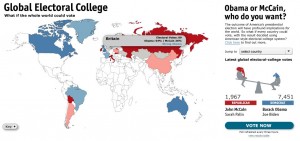Earlier in the week we blogged that the Global Investigative Journalism Conference in Lillehammer (GIJC) had received a little criticism for being a bit 1.0 in its coverage. But if its partcipants made limited use of the social web to report live from the event, the Computer Assisted Reporting (CAR) contingent was out in force and here’s what they had to say.
Paul Myers, a BBC specialist in internet research, and web trainer, told Journalism.co.uk how slow CAR is in the UK. “People pick up on the flashy stuff like Google maps, but not CAR,” Myers said.
“This is quite typical in my experience – lots of resistance when I started training journalists in using the internet at BBC in the early 90s. It has been uphill struggle to convince people to use the web,” he told us.
In an opening session, the director of computer-assisted reporting at ProPublica, Jennifer LaFleur, urged people not to be deterred by how complicated it sounds. “Computer assisted reporting (CAR) is doing stories based on data analysis, but it’s really just working with public records,” she said.
“Don’t get intimidated by the statistics, maths or excel and access focus: these are just the tools we use to report with.”
Along with database editor Helena Bengtsson, from Sweden’s public broadcaster SVT, LaFleur highlighted several recent successful news stories that had been unearthed by using CAR.
One, an investigation into the voting patterns of Swedish EU-parliamentarians, showed that several of the most high-profile parlimentarians abstained in 50 per cent or more of cases, causing political outcry.
But, maybe journalists should leave the more high powered CAR to the IT people? No, was the blunt answer to that audience question. CAR should be par for the course, said LaFleur. “90 per cent of stories we presented here were done with Access and Excel. I am a journalist doing journalism,” she said.
“You have to interview the data as you interview a person,’ added Helena Bengtsson. “When I do a query on data… I’m asking the data as a journalist.
“There is a lot of information in the data that IT-people wouldn’t have discovered. We’re journos first, data-specialists second,” Bengtsson said.
GCIJ Lillehammer also ran classes on RSS, scraping the web, being an online ‘bloodhound’ and effective web searching.
“There are two reasons for that: we have the training expertise and see major need for training in web research and computer assisted reporting”, Haakon Hagsbö, from SKUP (a Norwegian foundation for investigative journalism) and one of the organisers of GIJC Lillehammer, told Journalism.co.uk.
“It has certainly been very popular at earlier conferences. People don’t know what they don’t know until they attend the training. It’s a real eyeopener, but they soon find that it’s not rocket science, as these are simple yet powerful tools. We see more and more examples of colleagues from all over the world who meet online and use the web for research.
In reponse to Isaac Mao’s comment that there had been a low take-up of live social media reporting from the conference, Haugsbö said: “We have streamed everything live online, but other than that I don’t have a good answer to this.”
